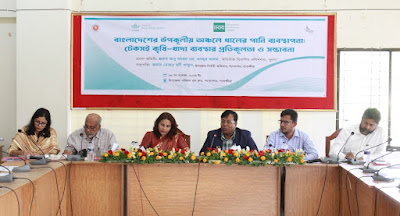SHATKHIRA, Bangladesh, 02 December 2024: Freshwater resources in salt-prone deltaic regions like Bangladesh are becoming increasingly unreliable due to climate change and other anthropogenic drivers, leading to declining agricultural productivity and heightened vulnerability among coastal communities. In response to this growing crisis, a sub-national workshop entitled “Inclusive Canal Water Management in Coastal Bangladesh: Challenges and Potential for Resilient Agri-Food Systems” was held at the Shyamnagar Upazila complex in Satkhira on 28th November 2024.
Freshwater canals, traditionally considered common-pool resources, play a vital role in supporting food production, domestic needs, and ecosystem services in Bangladesh. However, canal mismanagement and lease abuse have become widespread. Leaseholders often convert canals into intensive fish or shrimp farms and other agriculture, which restricts public access, disrupts seasonal flows, and exacerbates waterlogging risks. This has led to significant consequences such as reduced income for poor fishers, limited irrigation water for dry-season crops, and increased vulnerability to crop losses during the rainy season.
A case study conducted in Munishiganj Union, Satkhira, revealed that 42.98% of households face agricultural water insecurity, with freshwater scarcity severely disrupting agri-food systems, especially during the dry season. However, community-led rehabilitation of two canal sections in the area has restored water access, enabling rice cultivation on 7,000 bighas of land and highlighting the potential of inclusive approaches.
Speaking at the workshop, Upazila Agricultural Officer of Shyamnagar Mr. Nazmul Huda emphasized the need for project-based canal excavation and sustainable irrigation systems, stating, “Shyamnagar faces a food deficit of 80 metric tons this year. We must prioritize solutions to improve water access and agricultural productivity.”
Water issues are multifaceted and far-reaching in the community. Dr. Mou Rani Sarker from the International Rice Research Institute (IRRI) remarked that “Water insecurity disproportionately impacts women, who bear the burden of increased domestic and agricultural workloads, economic losses, food poverty, and physical strain. Addressing this issue requires gender-sensitive strategies and greater community participation.”
Dr. M Mokhlesur Rahman, Executive Director of the Center for Natural Resource Studies (CNRS), highlighted the need for integrated water management policies, stating, “Current policies often lack coordination between water, agriculture, and food systems. Emerging efforts such as the NGO-led canal rehabilitation in Kultoli demonstrate the potential for restoring livelihoods and improving water security.”
Mst. Roni Khatun, Upazila Nirbahi Officer of Shyamnagar and chairperson of the workshop, noted that salinity, siltation, and encroachment are key challenges in the region. She emphasized the administration's ongoing efforts to cancel 16 jalmahal leases and engage communities, particularly women, in sustainable water management initiatives.
Mr. Abu Sayeed Mohammed Manjur Alam, Additional Divisional Commissioner of Khulna Division, underscored the importance of systematic interventions, urging local administrations to update canal databases, excavate silted canals, cancel exploitative leases, and remove encroachments.
The workshop concluded with a collective call to action: prioritize localized, context-specific solutions and amplify marginalized voices to achieve sustainable agri-food systems. Such an approach, supported by community participation and government policies, is essential to building resilience in coastal Bangladesh.
###
Learn more about IRRI (www.irri.org) or follow us on social media and networks (all links down the right column).





No comments:
Post a Comment